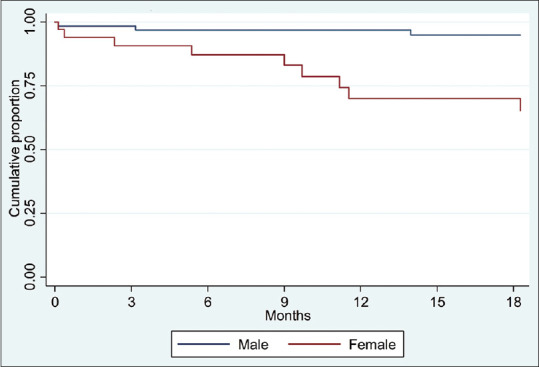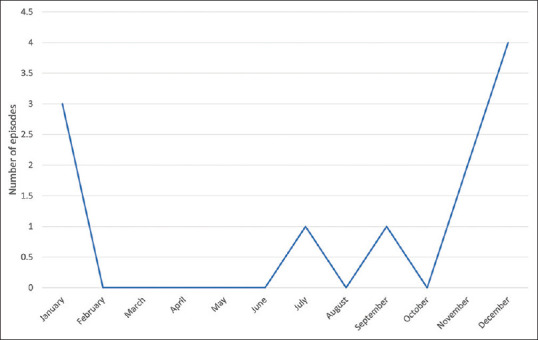Respiratory Syncytial Virus Infection among Adults after Hematopoietic Stem Cell Transplantation.
IF 1.1
Q4 INFECTIOUS DISEASES
Journal of Global Infectious Diseases
Pub Date : 2022-08-26
eCollection Date: 2022-07-01
DOI:10.4103/jgid.jgid_11_22
引用次数: 0
Abstract
Introduction: Respiratory syncytial virus (RSV) is a common cause of morbidity among hematopoietic stem cell transplant (HSCT) recipients, with RSV-associated lower respiratory tract infection carrying high mortality rates. There have been no large studies till date, describing the incidence, clinical features, and outcomes of RSV infection among adult HSCT recipients in India. Methods: A prospective cohort of 100 adults who underwent HSCT was followed up for a maximum period of 18 months starting from the date of transplantation for any episode of respiratory tract infectious disease (RTID). Respiratory samples were collected for laboratory confirmation of the presence and subtyping of RSV by real-time reverse transcriptase-polymerase chain reaction. Results: The study population comprised of 66% (66/100) males and 34% (34/100) females. Autologous HSCT recipients constituted 78% (78/100) and allogeneic HSCT recipients constituted 22% (22/100) of the study population. The incidence of RSV-RTID among adults after HSCT was 0.82/100 patient months. Most cases occurred during the winter season and the predominant subtype was RSV-A (9/11, 81.8%). Lower RTID was the most common clinical diagnosis made at presentation (9/11, 81.8%). Female gender was predictive of RSV-RTID (log rank P = 0.002). All the RSV-RTID episodes recovered completely without targeted therapy. Conclusion: RSV is a significant cause of morbidity among adult HSCT recipients in India. Prophylaxis and treatment measures need to be instituted after a proper risk-benefit assessment. Longitudinal studies with larger sample sizes are needed to confirm these results.


成人造血干细胞移植后呼吸道合胞病毒感染的研究
呼吸道合胞病毒(RSV)是造血干细胞移植(HSCT)受者发病的常见原因,与RSV相关的下呼吸道感染具有高死亡率。迄今为止,还没有大型研究描述印度成人造血干细胞移植受者中RSV感染的发生率、临床特征和结果。方法:从移植之日起,对100名接受HSCT的成人进行最长18个月的呼吸道传染病(RTID)随访。采集呼吸道样本,通过实时逆转录-聚合酶链反应实验室确认RSV的存在和分型。结果:研究人群中男性占66%(66/100),女性占34%(34/100)。自体移植受体占研究人群的78%(78/100),异体移植受体占22%(22/100)。成人HSCT后RSV-RTID的发生率为0.82/100患者月。以冬季发病为主,主要亚型为RSV-A型(9/11,81.8%)。下RTID是最常见的临床诊断(9/11,81.8%)。女性对RSV-RTID有预测作用(log rank P = 0.002)。所有RSV-RTID发作均完全恢复,无需靶向治疗。结论:RSV是印度成人移植受者发病的重要原因。需要在进行适当的风险-效益评估后制定预防和治疗措施。需要更大样本量的纵向研究来证实这些结果。
本文章由计算机程序翻译,如有差异,请以英文原文为准。
求助全文
约1分钟内获得全文
求助全文
来源期刊

Journal of Global Infectious Diseases
INFECTIOUS DISEASES-
CiteScore
3.30
自引率
0.00%
发文量
31
审稿时长
29 weeks
期刊介绍:
JGID encourages research, education and dissemination of knowledge in the field of Infectious Diseases across the world thus promoting translational research by striking a synergy between basic science, clinical medicine and public health. The Journal intends to bring together scientists and academicians in Infectious Diseases to promote translational synergy between Laboratory Science, Clinical Medicine and Public Health. The Journal invites Original Articles, Clinical Investigations, Epidemiological Analysis, Data Protocols, Case Reports, Clinical Photographs, review articles and special commentaries. Students, Residents, Academicians, Public Health experts and scientists are all encouraged to be a part of this initiative by contributing, reviewing and promoting scientific works and science.
 求助内容:
求助内容: 应助结果提醒方式:
应助结果提醒方式:


